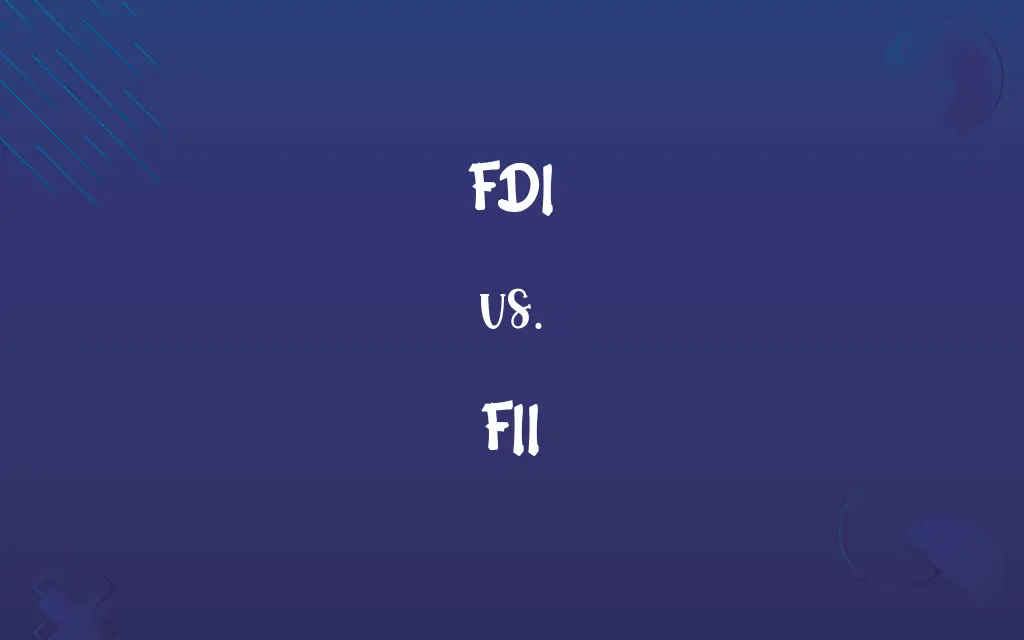FDI vs. FII: Know the Difference

By Shumaila Saeed || Published on January 19, 2024
FDI (Foreign Direct Investment) involves direct ownership and control in a business, whereas FII (Foreign Institutional Investment) refers to investing in financial assets of a foreign country without direct control.

Key Differences
Foreign Direct Investment (FDI) is a long-term commitment where a company or individual based in one country makes a substantial investment in a company based in another country. This usually involves buying a significant stake in the company or setting up business operations, such as a factory or office. Foreign Institutional Investment (FII), on the other hand, refers to investments made by investors or investment companies registered in a country outside of the one in which they are investing, primarily in financial assets like stocks and bonds. FIIs are typically more focused on short-term returns and do not seek significant control or management in the company.
Shumaila Saeed
Jan 19, 2024
The nature of FDI is such that it's directly involved in the management, operations, and decision-making of the foreign enterprise. This often results in a transfer of technology, skills, and knowledge to the host country. FII investments are more passive, as they do not involve direct management or control. Instead, FIIs invest in securities and other financial assets, contributing to the capital markets of the host country but not directly influencing the management practices or operational strategies of the companies they invest in.
Shumaila Saeed
Jan 19, 2024
FDI is considered more stable than FII as it is less prone to rapid exits or capital flight. Since FDI involves physical assets and a long-term perspective, investors are less likely to withdraw their investment abruptly. FII investments are seen as more volatile, as they can be quickly sold off, leading to sudden capital outflows which can negatively impact the host country's economy. This makes FII more sensitive to the economic and political conditions of the host country.
Shumaila Saeed
Jan 19, 2024
The impact of FDI on the host country's economy can be profound. It often leads to job creation, improvement in infrastructure, and an overall boost in economic activity. FII also contributes to the economy by providing capital to companies and governments, but its impact is less direct in terms of tangible economic development such as infrastructure growth or job creation.
Shumaila Saeed
Jan 19, 2024
Comparison Chart
Type of Investment
Direct investment in businesses
Investment in financial assets
Shumaila Saeed
Jan 19, 2024
ADVERTISEMENT
Control and Management
Involves control and direct management
No direct control or management
Shumaila Saeed
Jan 19, 2024
Investment Horizon
Long-term perspective
Short-term, market-driven perspective
Shumaila Saeed
Jan 19, 2024
Impact on Host Economy
Direct impact through job creation, infrastructure
Indirect impact, mainly in capital markets
Shumaila Saeed
Jan 19, 2024
Stability
More stable, less sensitive to market fluctuations
More volatile, sensitive to economic and political changes
Shumaila Saeed
Jan 19, 2024
FDI and FII Definitions
FDI
FDI is a cross-border investment where an investor starts or acquires a business in another country.
The FDI in Mexico allowed the company to take advantage of lower production costs.
Shumaila Saeed
Jan 05, 2024
ADVERTISEMENT
FII
FII refers to investments made by investors in markets outside their own country.
The pension fund's FII in Asian stock markets aimed at capitalizing on emerging market growth.
Shumaila Saeed
Jan 05, 2024
FDI
FDI refers to investing in a foreign business with a long-term interest and significant stake.
The company's FDI in the Italian manufacturer helped revolutionize their production process.
Shumaila Saeed
Jan 05, 2024
FII
FII encompasses the buying of stocks and bonds in foreign financial markets.
Their FII in the Brazilian market was influenced by the country's strong economic indicators.
Shumaila Saeed
Jan 05, 2024
FDI
FDI is the direct investment in production or business in a country by a company from another country.
The Japanese auto giant's FDI in the United States led to the establishment of multiple car factories.
Shumaila Saeed
Jan 05, 2024
FII
FII represents foreign institutional investors' participation in another country's financial market.
The mutual fund's FII in Indian equities was a decision driven by the market's high potential returns.
Shumaila Saeed
Jan 05, 2024
ADVERTISEMENT
FDI
FDI represents investments that establish a lasting interest and significant influence in a foreign enterprise.
Through FDI, the firm expanded its operations into the European market.
Shumaila Saeed
Jan 05, 2024
FII
FII involves institutions investing in financial assets of a foreign country.
The hedge fund's FII in European bonds was a strategic move to diversify its portfolio.
Shumaila Saeed
Jan 05, 2024
FDI
FDI involves acquiring ownership in a foreign entity for control and influence.
Their FDI in the Canadian tech startup gave them access to innovative AI technologies.
Shumaila Saeed
Jan 05, 2024
FII
A nonprofit organization advocating for free speech on college campuses.
The FII defended the student's right to express their opinions.
Shumaila Saeed
Jan 05, 2024
Repeatedly Asked Queries
What is FII?
Foreign Institutional Investment refers to foreign entities investing in a country's financial markets, such as stocks and bonds.
Shumaila Saeed
Jan 19, 2024
What is FDI?
Foreign Direct Investment involves foreign entities investing in a country's physical assets and businesses.
Shumaila Saeed
Jan 19, 2024
What is the purpose of FDI?
FDI is typically done to establish a long-term presence and gain control in a foreign market.
Shumaila Saeed
Jan 19, 2024
Which sector attracts more FDI investments globally?
The manufacturing sector typically attracts more FDI investments worldwide.
Shumaila Saeed
Jan 19, 2024
How does FDI differ from FII?
FDI involves owning and controlling physical assets and businesses, while FII involves investing in financial instruments like stocks and bonds.
Shumaila Saeed
Jan 19, 2024
What is the purpose of FII?
FII is primarily for portfolio investment, seeking returns from financial market activities.
Shumaila Saeed
Jan 19, 2024
Are FDI and FII subject to the same regulatory restrictions?
No, FDI often faces more regulatory scrutiny and restrictions than FII due to its impact on local businesses and industries.
Shumaila Saeed
Jan 19, 2024
Is FII more liquid than FDI?
Yes, FII is generally more liquid, as it involves buying and selling financial assets in public markets.
Shumaila Saeed
Jan 19, 2024
Do FDI and FII impact a country's balance of payments differently?
Yes, FDI affects the current account, while FII affects the capital account of a country's balance of payments.
Shumaila Saeed
Jan 19, 2024
Which financial instruments are commonly associated with FII?
Stocks, bonds, and other market-traded securities are common FII investments.
Shumaila Saeed
Jan 19, 2024
Does FDI or FII have a greater impact on currency exchange rates?
FII can have a more immediate impact on currency exchange rates due to its short-term nature.
Shumaila Saeed
Jan 19, 2024
Is FDI more stable than FII during economic downturns?
Generally, FDI is considered more stable as it involves long-term commitments and physical assets.
Shumaila Saeed
Jan 19, 2024
Can a country have a negative FDI or FII inflow?
Yes, a country can experience negative inflows if there are divestments or outflows exceeding inflows.
Shumaila Saeed
Jan 19, 2024
Which type of investment contributes more to a country's economy, FDI or FII?
FDI generally has a more significant impact as it involves long-term investments in infrastructure and job creation.
Shumaila Saeed
Jan 19, 2024
Can individuals participate in FDI?
Yes, individuals can engage in FDI, but it is more common for corporations and large investors.
Shumaila Saeed
Jan 19, 2024
Can FII lead to higher volatility in financial markets?
Yes, FII investments can contribute to market volatility due to their short-term nature.
Shumaila Saeed
Jan 19, 2024
Which organization monitors and regulates FDI and FII at the global level?
There is no single global organization that regulates FDI and FII; each country has its own regulatory authorities and policies.
Shumaila Saeed
Jan 19, 2024
Are there tax differences between FDI and FII?
Yes, there are often different tax treatments for FDI and FII, depending on the country's tax laws.
Shumaila Saeed
Jan 19, 2024
Can a country restrict FDI and FII inflows?
Yes, countries can impose restrictions and regulations on both FDI and FII to protect their national interests.
Shumaila Saeed
Jan 19, 2024
How do governments attract FDI and FII?
Governments often offer incentives, tax breaks, and favorable regulatory environments to attract both types of investments.
Shumaila Saeed
Jan 19, 2024
Share this page
Link for your blog / website
HTML
Link to share via messenger
About Author
Written by
Shumaila SaeedShumaila Saeed, an expert content creator with 6 years of experience, specializes in distilling complex topics into easily digestible comparisons, shining a light on the nuances that both inform and educate readers with clarity and accuracy.









































































